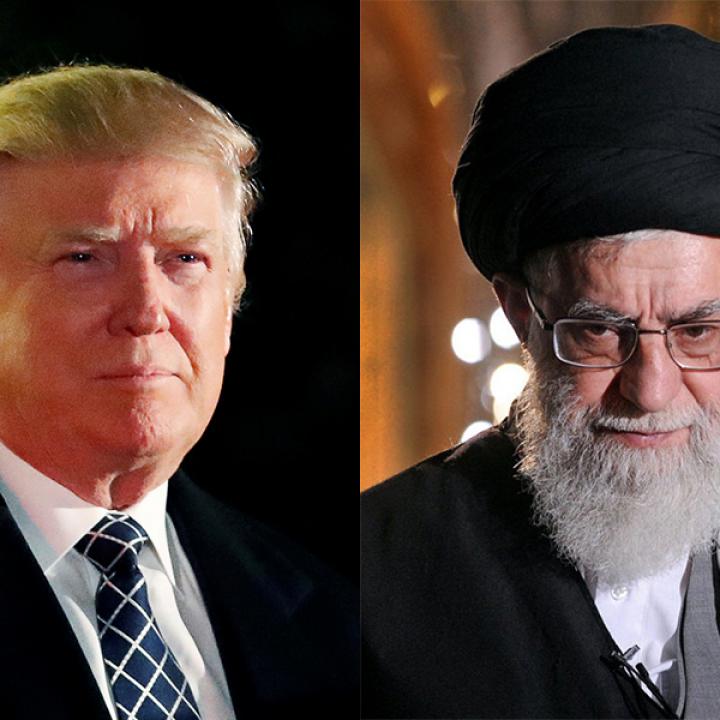
- Policy Analysis
- Articles & Op-Eds
A Deal Trump and Khamenei Could Make

Iran says it won’t negotiate with Washington under pressure, but it has done so in the past and might again.
Ayatollah Ali Khamenei, Iran’s Supreme Leader, has long maintained that the U.S. will never be satisfied with Iranian concessions until the Islamic Republic itself is conceded. This view informs the long-standing position of Iranian officials that they will not negotiate with the U.S. under pressure.
Unsurprisingly, the Iranian response to the recent intensification of the Trump administration’s “maximum pressure” campaign has been to test and expose the limits of American resolve, by triggering a series of sabotage and proxy attacks against oil tankers—two Saudi, one Emirati and one Norwegian—and oil pumping stations in Saudi Arabia.
With the U.S. sending more forces to the region and tensions mounting, it is interesting that both Trump and Khamenei have moved to halt the march toward a direct conflict. President Trump made clear he did not want a war, speaking of Iran’s “great potential,” and urging the leaders of the Islamic Republic to call him to “make a deal.” The Supreme Leader said in nationally televised remarks that “neither we nor they are seeking war.”
This doesn’t mean the Iranians are willing to engage in negotiations—not yet. Khamenei, who has spent decades questioning the value of talks with the U.S., does not want to appear to have caved to America. He still regards negotiations as being “poison.” Iran’s President Hassan Rouhani said the “situation is not suitable for talks and our choice is resistance only.”
Resistance, for Rouhani and Khamenei, could involve departing from the limitations imposed on Iran by the 2015 nuclear deal, known as the Joint Comprehensive Plan of Action, or JCPOA. Already, the Iranians have announced they will quadruple their rate of enrichment, meaning that they will soon exceed the 300 kg of low-enriched uranium they are allowed under the terms of the deal. Rouhani has put the European signatories of the JCPOA on notice that if they have not compensated the Iranians economically for the American sanctions by July 7, the Iranians may resume enriching to 20%, which could put them on a path to nuclear “break-out” capability.
This may be the Supreme Leader’s version of “maximum pressure” on Trump. But how long can Khamenei keep this up? His country is feeling the weight of the Trump administration’s sanctions: the economy is in free fall, businesses are shuttering and Iranians daily feel the loss of the value of their savings, and the skyrocketing prices of basic foods, medicines and consumer goods.
Khamenei may insist that Iran will not negotiate under pressure, but the Islamic Republic’s history suggests otherwise. In the past, when the pressures from the outside grew too high, endangering domestic stability, the Iranian leadership looked for a way to reduce those pressures and the related costs. That was true in the decision to end the war with Iraq in the 1988; to stop assassinating dissidents in Europe in the 1990s, when sanctions were threatened; to offer a nuclear bargain in 2003, after the U.S. defeated the Iraqi military in three weeks, and the Iranians feared they would be next; and in 2012, when Iran agreed to back-channel communications after the Obama administration ramped up sanctions on its central bank and the Europeans stopped buying Iranian oil.
Could we see a replay with the Trump administration? The conventional wisdom is that the Iranians want to wait out Trump and deal with his successor. That is almost certainly Khamenei’s preference, but much depends on how much economic hardship he believes the Iranian public will endure.
If Khamenei feels he must reduce the pressure, and opt for negotiations, these would almost certainly be indirect—direct talks would be too much of an admission of defeat. Using an intermediary like Vladimir Putin would likely appeal to both the Russian leader and Trump.
But what kind of deal would Trump be willing to strike? It is unlikely to be one based on Secretary of State Mike Pompeo’s 12 conditions for negotiations: those are seen by the Iranians as tantamount to requiring regime change. During his visit to Japan, Trump was clear that he was “not looking for regime change.” Instead, he said, his goal was “no nuclear weapons,” which leaves room for maneuver. But in truth, Trump’s only criterion for a deal seems to be his measure on most presidential matters: it must be better than the one Obama got.
One obvious improvement on the JCPOA would be to extend the sunset provisions limiting Iranian uranium enrichment, from the year 2030 to, say, 2045. This would defer a possible Iranian nuclear-weapons threat much farther into the future. But it would not deal with the regional threats resulting from Iran’s efforts to extend its reach and coercive means against Arab regimes and Israel. That would require persuading Iran to limit its military footprint in Syria and stop providing rockets and precision-guided missiles to Hezbollah and other proxies in Lebanon and Syria.
But the Iranians won’t make these concessions for free: they will seek the lifting of all sanctions, nuclear and non-nuclear. This would require Trump to decide how much he is prepared to give up. Obama was not willing to lift human-rights and terrorism-related sanctions. Trump, too, is likely to be reluctant to do so. Still, he might conclude that gaining time (an additional 15 years) and reducing the prospect of regional war between would be significant achievements. The great irony is that maximum pressure, as practiced by Trump and Khamenei, could yet push them in that direction—providing a miscalculation doesn’t first lead them into greater conflict.
Dennis Ross is the counselor and William Davidson Distinguished Fellow at The Washington Institute.
Bloomberg



